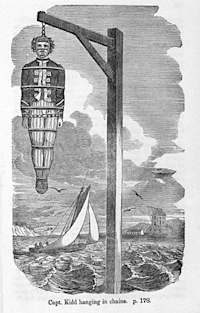“After checking his two pistols and tucking them in his belt, the defiant boatswain sneaked off towards the town gate, and, ignoring the cacophony of drums and bugles, merrily sang a rendition of the popular song Captain Kidd with slightly modified lyrics to himself.”

The Ballad of Captain Kidd also known more simply as Captain Kidd is an old English folk song about the infamous privateer turned pirate Captain William Kidd, who was hanged at Execution Dock in London for piracy on May 23, 1701. The song is listed in the Roud Folk Song Index (index number 1900), which is a database of around 250,000 references to nearly 25,000 songs collected from oral tradition in the English language from all over the world, compiled by Steve Roud, who is an expert on folklore and superstition.
The song was printed in Britain in 1701 within a month of Kidd’s death, finding its way to the colonies almost immediately, and narrates the rise and fall of the legendary pirate. The song’s structure mirrors the stages of Kidd’s life, beginning with his defiance of authority and ending with his execution. The use of the repeated refrain ‘When I sailed’ is meant to emphasize the recurring nature of Kidd’s actions and the inevitability of his fate. In contrast to other pirate ballads, The Ballad Of Captain Kidd stands out for its lack of glorification of Kidd’s exploits, focusing rather on the destructive consequences of his actions. One could say the song serves as a cautionary tale against piracy and other forms of lawlessness.
A closer look at history has shown that Kidd’s unsavoury reputation is largely the result of an exceptionally talented ballad-maker’s fancy. Captain Kidd’s conviction and execution may have in fact been a gross miscarriage of justice. Kidd was hung following a trial in which the accused was denied the right to counsel and the leading witnesses for the Crown were ‘turncoat’ government informers who testified against him to save their own necks. Kidd had been a highly-respected Scottish sea captain, who was commissioned as a privateer for the Crown in 1696, with specific instructions to operate against pirates and vessels of hostile nations. After a number of complex political dealings, Kidd was publicly proclaimed a ‘pirate’ and arrested in 1700. Kidd was charged with murdering a seaman by the name of William Moore, although he later claimed that the killing took place as a suppression of mutiny. Kidd’s trial commenced on May 8, 1701, and barely two weeks later he was executed. Within hours of his death, ballad writers were turning out songs about the notorious captain. The most famous of these, written to a variant of the tune best known today as Sam Hall, had a repentant Kidd telling his long and bloody story in the first person. A 25-verse version popular in the United States early in the 19th century had Kidd confessing to a host of crimes and sacrilegious sentiments. The remorseful last verses are in striking contradiction to all reports from the time which show Captain Kidd protesting his innocence up until his very last breath.
The ballad was later mentioned Washington Irving’s 1824 work Tales of a Traveler, and has survived in the oral tradition long enough for it to be recorded by numerous traditional singers. The song shares a melody with the American folk hymn What Wondrous Love Is This. You can hear a version of this song by Chelsea moon. It even featured as part of the soundtrack for the popular pirate series Black Sails.
The lyrics with the established 15 verses can be found on the website Sailor’s Songs, although there are reported to have been as many as twenty-five verses to the song, not to mention those made up by imaginative singers. A version in low German can be found on Musicanet.
The lyrics vary greatly from version to version of the song, but the refrain usually remains more or less the same. Here are two versions with varying lyrics.
